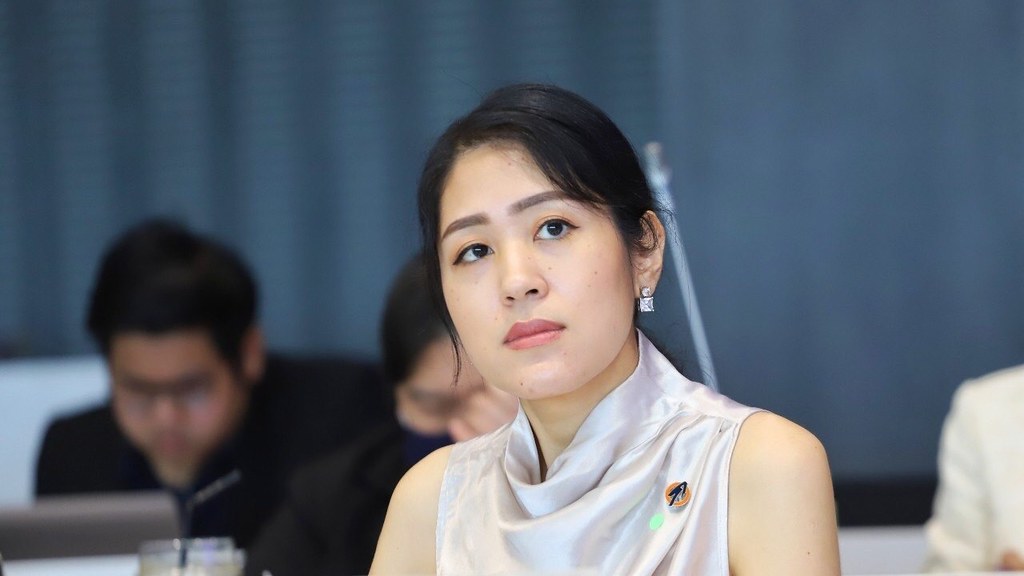Pannika Wanich, Piyabutr Saengkanokkul and Thanathorn Juangrungruankit, former MPs from the dissolved Future Forward Party (FFP), have had their passports revoked after being accused of sedition.

A File photo of Pannika
On 20 April 2022, Pannika, currently an executive member of the Progressive Movement, a group established by former FFP members, applied for a new passport at a temporary passport office in the MBK shopping centre only to have her request denied.
Checking with the Consular Affairs Department, she found that the rejection stemmed from an order issued on 19 April 2021 at the Phayathai Police Station requesting that her passport and the passports of Thanathorn and Piyabutr be revoked as they have been accused of committing crimes under Section 116 of the Criminal Code, widely known as Sedition Act.
A sedition complaint was lodged against the three by Suwit Thongprasert, previously known as Buddha Issara, a former monk who played a major role in the People's Democratic Reform Committee (PDRC), an anti-government movement that set the stage for the 2014 coup. Their alleged offences date to their time with the Future Forward Party. An indictment hearing is scheduled for 19 May 2022.
According to the Move Forward Party (MFP) press team, a Consular Affairs officer said that a letter will be sent to the Phayathai Police to clarify why it was necessary to revoke the passports. If the request is withdrawn, new passports will be issued.
At 10.00 of 21 April, Pannika went to Phya Thai police station to discuss the matter with Lt Col Baramee Wong-inta, a vice superintendent of investigation who issued the revocation request on behalf of the station superintendent. Before entering the police station, she pointed out to media representatives that as she and her colleagues have yet to be indicted by the prosecutor, a court order to revoke their passports has not been issued.
She also noted that Piyabutr has had no problem travel abroad, despite being named in the same police request, and added that although she is not sure how such things work, it has made her life more difficult.
Leaving the station, Pannika reported being told that the request was fully in keeping with the guidelines for the treatment of individuals accused of national security-related offences, and that the police could be held accountable for neglecting their duties if they failed to make it.
According to Pannika, the police also stated that the letter sent to the Consular Affairs Department simply asked for cooperation, leaving the decision to grant a passport up to the Department Director. She was also told that the request would be withdrawn by noon on 21 April.
Prachatai made a phone call to Phya Thai police station's vice superintendent (investigation), Pol Lt Col Wittayakorn Suwanruangsri on 23 April, but received no answer whether the letter has been revoked or not.
Section 116 legal provisions pertain to national security. It prohibits individuals from unconstitutionally calling for a change of law, causing unrest and disaffection among the public, or causing people to violate the law. Those found guilty can face up to 7 years of imprisonment.
In recent years, it has often been used in conjunction with Section 112 of the Criminal Code, the lèse majesté law, another security-related statute. The provision of both have been broadly interpreted, raised concerns among international rights bodies that the laws are being used to constrain freedom of expression.
Pannika is not the first person to face difficulties in obtaining a passport. In November 2021, the Samranrat Police Station asked the Department of Consular Affairs to revoke the passports of 13 people charged with sedition for their involvement in pro-democracy rallies.
In August 2021, a confidential ‘watchlist’ compiled by the Immigration Bureau was leaked to the media. It contained the names and personal details of 183 activists, human rights lawyers, academics, Move Forward Party members and individuals involved with the dissolved Future Forward Party.
The names of Thanathorn, Pannika, and Piyabutr were on the watchlist, begging the question of whether the rest of those listed could face a similar ban in the future.
On 1 February of this year, Ravisara Eksgool, who was awarded a scholarship to study overseas, posted on Facebook that her request for a new passport had been denied, reportedly because the case against her was a matter of national security.
Ravisara is one of 13 people indicted on lèse majesté and sedition charges for participating in a protest in front of the German Embassy in Bangkok on 26 October 2020.
She was eventually able to take up her scholarship and is now studying her Master Degree in Germany, but it took 7 requests before the court agreed that she was not a flight risk.
Sainam (pseudonym), an underage youth charged with royal defamation for attending a ‘fashion show’ protest, was reportedly denied a passport as well. On 28 January 2020, he went to the show wearing a crop top. A message painted on his exposed belly stated that King Vajiralongkorn was not his father.
Prachatai English is an independent, non-profit news outlet committed to covering underreported issues in Thailand, especially about democratization and human rights, despite pressure from the authorities. Your support will ensure that we stay a professional media source and be able to meet the challenges and deliver in-depth reporting.
• Simple steps to support Prachatai English
1. Bank transfer to account “โครงการหนังสือพิมพ์อินเทอร์เน็ต ประชาไท” or “Prachatai Online Newspaper” 091-0-21689-4, Krungthai Bank
2. Or, Transfer money via Paypal, to e-mail address: [email protected], please leave a comment on the transaction as “For Prachatai English”
